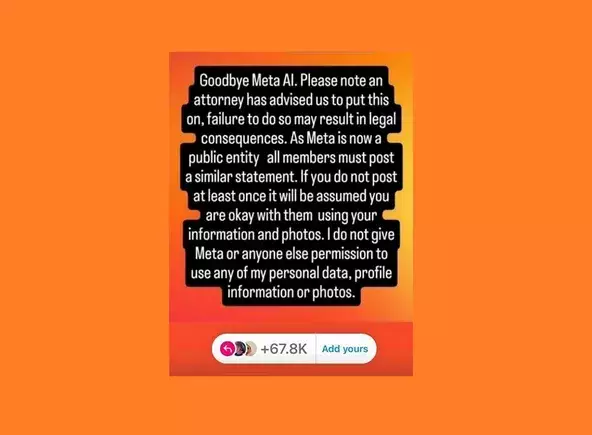In an age where digital engagement shapes our perceptions of reality, the rampant spread of misinformation has become increasingly troublesome. Many individuals fervently engage with social media, sharing content that they may not fully comprehend or that lacks veracity. A recent phenomenon involves users attempting to assert their legal rights through innocuous posts across platforms like Instagram and Facebook. These declarations, often accompanied by dramatic statements and hashtags, create the illusion that a simple social media post can alter legal agreements or private usage policies established by corporations. However, such actions are nothing more than misguided expressions, misleading the public and fostering a culture of passive complacency when it comes to understanding one’s rights.
The underlying issue with these practices lies in the inherent misunderstanding of how agreements and terms of service work. Many social media users rush to post declarations claiming to safeguard their content from corporate exploitation, all while ignoring the fact that they have already consented to these terms by clicking “I agree.” This common oversight speaks volumes about the lack of awareness among users regarding their digital environments. It’s akin to shouting “I refuse to pay my bills” and imagining that this declaration somehow alters the financial obligation. Such misunderstandings highlight the deep-seated need for education around digital literacy and user rights, especially in an ecosystem that seems simple on the surface but is filled with intricacies that can easily ensnare the unaware.
The attempt to declare ownership over shared content through social media channels is a futile gesture, akin to yelling “bankruptcy” without legally filing for it. This misguided activism, often perpetuated by well-meaning yet misinformed individuals, promotes a narrative of empowerment that lacks grounding in reality. Prominent public figures sharing these types of posts can provide an illusion of legitimacy; however, the underlying truth remains unchanged. Meta, the parent company of Facebook and Instagram, has been transparent about its policies regarding user data and content usage. Their statements clearly indicate that any public information shared on their platforms may be utilized for training AI systems, further emphasizing the futility of informal declarations.
Just because you may desire to change your circumstances does not mean that an Instagram story or post will produce a different outcome. For users in the European Union, there exists a formal mechanism known as the “Right to Object,” allowing them greater control over their shared content. Yet, for users in other territories, such protections remain elusive. This bewildering discrepancy should serve as a catalyst for a more profound conversation about user rights and corporate responsibilities at a global scale. It is vital for individuals to inform themselves rather than relying solely on viral content, which often misrepresents complex legal matters.
Instead of engaging in futile social media theatrics, users are encouraged to seek knowledge about their rights, including understanding copyright issues and carefully reading user agreements. The internet provides a treasure trove of resources, granting users access to valuable knowledge on navigating the intricacies of digital platforms. Following credible sources, participating in dialogues about digital literacy, and advocating for equitable regulations regarding user content will ultimately foster a more informed populace, equipped to engage genuinely in discussions surrounding their digital rights.
While social media can serve as a powerful tool for connection and awareness, it also harbors the potential for misinformation and disengagement. As users navigate their digital lives, it is imperative to discern the difference between meaningful advocacy and mere engagement theater. By committing to responsible engagement and prioritizing informed discussions on digital rights, individuals can combat the pervasive culture of misinformation and actively participate in shaping a more equitable digital landscape. Remember, the path to empowerment lies not in whimsical postings but in understanding the rules of the game and advocating for change through informed action.

